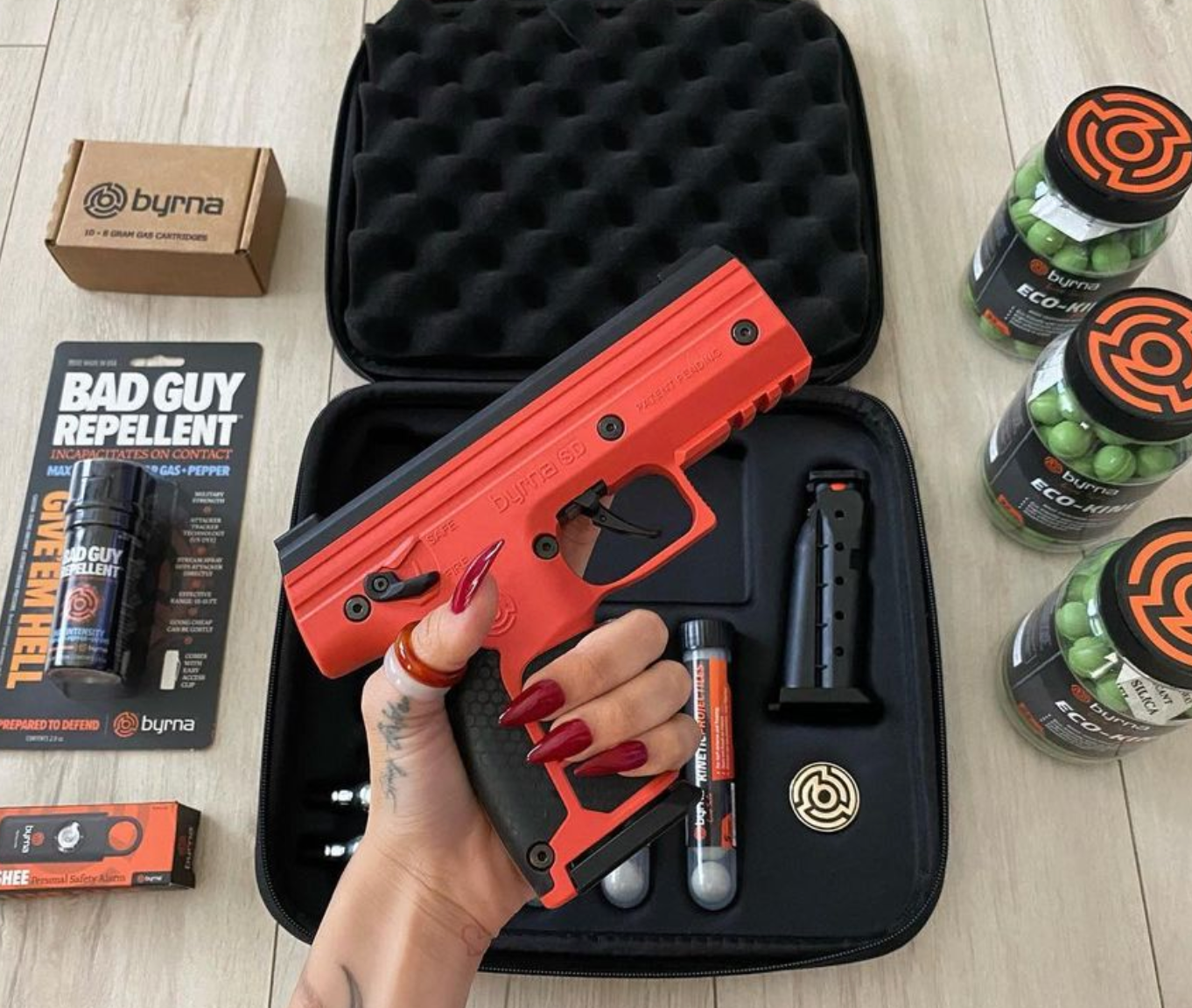
Statistics Canada reports that nearly 30% of older adults feel less safe in their neighborhoods compared to five years ago. Say you have a grandmother who just wants to walk her golden retriever at sunset or a grandfather who likes to go for early morning jogs before the streets get busy. These moments shouldn't need a security detail. And sadly, this change is happening in urban and rural communities across the country.
Canada actually has a few permit-free self-defense options that follow our national weapons laws and can help seniors feel more confident when they're out and about. Did you know that a personal alarm can be more helpful than pepper spray in most situations? I'll go over some tips here based on publicly available laws and court cases - though, of course, this isn't meant to replace formal legal advice if you ever need it.
I'm going to talk about Canada's self-defense laws and show you some techniques and tools that stay within legal boundaries, focusing on what actually works within our legal system.
Table of Contents
Canada's Self-Defense Laws and Section 34
Your response has to match the threat you might have. If someone shoves you, you can't pull out a baseball bat and start swinging. Courts call this "proportionality," and they take it really seriously. The force you use needs to match what's happening - you can't act on something that might happen tomorrow or next week.
Judges see cases where normal people went too far and ended up facing assault charges themselves. Your defensive action turns into a crime when you use more force than what you were defending against. People go to prison for these kinds of mistakes.

Here's where it gets tough for seniors who want to carry protection. Canada doesn't allow you to carry any weapon specifically for self-defense - this includes knives, pepper spray, and obviously firearms. The government prioritizes public safety over personal preparedness. Even the best intentions don't matter here.
The police charge seniors with prohibited items the same way they charge anyone else. Courts give the same penalties no matter how old you are or how worried you are about your personal safety. You'll end up with a criminal record from these well-meaning decisions.
When courts look at self-defense cases, they ask tough questions. Could you have walked away instead? Did you escalate the situation? Was the threat happening right then? These are the questions that decide your legal fate. Take the R. v. Khill case from 2020 - the Supreme Court made it crystal clear that you can't just claim self-defense after the fact.
These laws might frustrate seniors who don't feel safe. Courts look at everything you did and if a normal person would have done the same action.
Martial Arts That Work for Older Adults
There are a few martial arts that work for older adults because they use technique instead of raw power. Krav Maga teaches you basic moves that anyone can learn, regardless of their fitness level. Aikido uses an opponent's force against them instead of making you try to overpower someone who could be twice your size.
Smart technique beats brute strength every single time. Most attackers just use their size and aggression to scare people and overpower them. When you are aware of how to use that energy against them, their own momentum turns into your biggest help. Your body learns to move in efficient ways instead of trying to fight against someone who's stronger than you.
Tai Chi might sound like it's too gentle. But it builds real defensive skills. The slow movements help you stay balanced while you learn how to manage attacks - plus, they're much easier on your joints as you get older. Sinclair Internal Arts has Tai Chi programs designed for seniors, with lessons designed for small groups.

The Japanese Canadian Cultural Centre runs Aikido classes for adults, and they welcome beginners. You don't need to worry about keeping up with twenty-year-olds since these instructors understand what your joints can and can't do. They've been working with older students for decades. Plenty of students in their seventies learn basic wrist releases and escape holds in just a few months.
The right moves can do all of the work for you instead of trying to muscle your way out of a situation. Your attacker expects you to panic or freeze up. They don't expect someone who knows how to slip out of a grab or step away from danger.
Most fights end before they actually start when you show that you're calm and confident. Predators go after people who seem weak or aren't paying attention. Your training changes how you carry yourself and how you look at what's going on around you. You go from feeling like a victim to feeling ready for whatever comes.
You do need to watch out for a few problems, though. Don't push yourself to stretch any more than what feels comfortable. Falls when you're practicing can actually hurt you, so make sure that your instructor knows if you have any balance problems. The right instruction stops most accidents from happening in the first place. It's always worth talking to your doctor before you start something new like this.
Simple Tools That Can Help Keep You Safe
The items you already carry every day can do two jobs when you need them. A bright flashlight that puts out 300 lumens will blind an attacker long enough for you to get away. You don't need to buy an expensive tactical model. Any sturdy flashlight from your local hardware store will work just fine.
Flashlights can throw off someone who's trying to hurt you. The bright light blinds them for a few seconds and gives you the time you need to get some distance between you. Your attacker can't come after you if they can't see where you're going. Those few seconds can make the difference between getting away safely or not.
Personal alarms are tiny but incredibly loud. These devices clip right onto your keychain, so you'll always have one with you. When you pull the pin or press the button, they let out a shriek that's 120 decibels or louder. That's loud enough to wake up everyone nearby and scare off most people who mean you harm.

A walking stick made from strong wood or metal gives you something solid if someone gets too close for comfort. Since you're not carrying it to use as a weapon, there's nothing illegal about having one. It's just something that helps you walk that also happens to be pretty sturdy.
Don't forget about the basic whistle, either. Your phone might run out of battery right when you need help the most - but a whistle will always work. Keep one in your jacket pocket, or wear it on a cord around your neck. The sharp sound cuts through other noise and lets people nearby know you need help. You never have to worry about dead batteries with a whistle. The sharp sound carries through walls and windows. You're much safer when people around you know that something's wrong.
One last point to remember - Canadian law is very strict about why you're carrying something. You can carry these items for what they're normally used for without needing any permit. If you do have to use them to protect yourself, that's completely legal as long as you're defending yourself from a real threat and not trying to start a fight.
What You Cannot Carry in Canada
Now, let's talk about what you can't carry. The Criminal Code is pretty clear about handguns and switchblades - there's no confusion here. You're not allowed to carry these without the right permits and licenses. Bear spray is also tough because you can only use it for bears.
You might think pepper spray designed for humans would be perfect for self-defense. But sadly, Canada considers it a prohibited weapon under sections 90 and 91 of the Criminal Code. The 2019 Vancouver case shows just how strict the courts are about bear spray being used wrong - someone used it on people instead of wildlife and ended up with serious consequences.

The courts won't accept "I didn't know" as a defense with prohibited weapons. Your intentions matter less than the law on the books. Even if you carry these items with no plans to use them, you can still end up with legal problems that will follow you for years.
The temptation to carry these items makes perfect sense. When you're feeling vulnerable, you naturally want the strongest protection you can get. But criminal charges create problems that last much longer than the time you felt unsafe.
Some prohibited weapons charges come with mandatory minimum sentences. Legal alternatives are out there, so there's no reason to take that chance. Online forums and websites spread plenty of bad advice about what's actually legal to carry in Canada. Reddit threads aren't legal authorities, no matter how confident the commenters sound.
You're putting your freedom and clean record in danger when you have other options. The internet loves to make Canadian weapon laws seem easy. But the reality is that these laws are confusing, and they change based on your intent and situation. Different provinces have different laws, too, which is another issue that catches people off guard. What seems simple online gets pretty confusing when you're sitting across from a prosecutor.
Daily Safety Habits That Work Around the Clock
The best defense usually starts long before you ever need to defend yourself. Routines like keeping your porch well-lit or texting a friend when you head out for groceries - these are the types of activities that create layers of protection working for you around the clock.
These kinds of habits usually become second nature within just a few weeks. Your family feels better while you build up reliable safety systems that work automatically.
A quick friend text takes just seconds to send and beats running into possible danger alone. Neighborhood Watch programs and Public Health Agency reports always show that crime goes down when communities stay in touch. Your evening walk gets much safer when Mrs. Chen from next door joins you twice a week. You can build these relationships naturally through shared activities - maybe it's a walking group or just talking at the mailbox.

Motion lights work every single night without running up big electricity bills and scare away raccoons and unwanted visitors. These little changes to your environment don't cost much but give you round-the-clock protection. Phone check-ins with family members create accountability that helps everyone sleep better at night.
A motion light costs less than dinner out but works every night for years.
Physical fitness classes designed for older adults help in two ways. They help stop falls while they build up the core stability you'd need if someone ever tries to confront you. You can usually find these classes at community centers for pretty fair rates. Moving around also helps cut back on anxiety and keeps your mind focused.
One self-defense workshop doesn't make you invincible. Overconfidence after a single class can actually put you in greater danger than before. You should plan to refresh those skills every few months because muscle memory fades faster than we'd like to admit. Your smartphone skills matter just as much as your physical ones if you want to stay safe and connected. With that said, your confidence needs to match your abilities, not your memories from six months ago.
Protect Yourself and Your Family
Say you remember that early morning dog walk we talked about at the beginning. The same person who felt vulnerable walking alone now has a much better picture of what Canada's laws actually let them do for protection. You've learned about the legal boundaries that guide every situation you might run into, discovered martial arts programs designed specifically for older adults, and looked at helpful tools that stay within the law. We also talked about what you need to stay away from completely and how your everyday habits can keep you safer.
The path forward is actually pretty manageable. Maybe this week, you'll look up a tai chi class in your neighborhood, or maybe you'll pick up a personal alarm on your next shopping trip. You might even read through Section 34 of the Criminal Code to better understand your legal rights.
Your neighborhood gets more familiar when you walk it. Local classes help you meet others who share similar concerns. Reading the legal text gives you the confidence to talk about your rights when situations come up.
While this information gives you a strong foundation, remember that it doesn't replace professional legal advice when you need it. Laws can be tricky, and they sometimes work differently depending on the situation. For the most up-to-date and official information, check out the Government of Canada's justice website or contact local law enforcement for advice specific to your area.

For products that keep you protected within legal limits, at Byrna Canada, we have options you can count on that fit right within these laws. Our less-lethal pistols, rifles, CO2 cartridges, and sirens don't need any background checks and are completely legal in all provinces. No waiting periods or paperwork delays either. We ship directly to your door with free shipping on all launcher orders. Visit us at Byrna.ca to check out our full lineup and take your next step toward being safe and prepared.




